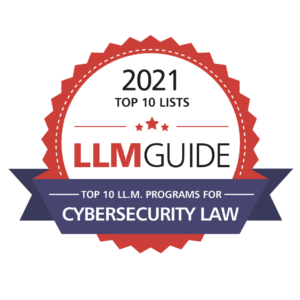This concentration provides students with a sophisticated understanding of the legal, policy, and technical architectures associated with cybersecurity. It is designed from the ground up to be transdisciplinary, featuring bespoke courses open not just to law students but to other graduate schools from across the campus. No prior expertise is required or expected, but the Strauss Center for International Security & Law (Strauss Center) particularly encourages applications from JAG attorneys as it offers courses in National Security Law. As noted below, the program includes a course expressly designed to provide an introduction to key technical concepts.

Texas Law’s Cybersecurity LL.M. is offered in conjunction with the Integrated Cybersecurity Studies Program at the Strauss Center. The Strauss Center is a university-wide organization that promotes innovative courses, policy-relevant research, and high-impact events concerning a broad array of security and foreign affairs topics. Several Strauss Center programs focus on the intersection of technology, law, and policy, and the Center places a special priority on promoting the interdisciplinary study of cybersecurity. Participants selected for the Cybersecurity LL.M. also become “cybersecurity fellows” with the Strauss Center, and as such constitute a special cohort participating in a wide range of Strauss Center activities (including conferences and cybersecurity policy competitions)
Internal Scholarships
- Good Neighbor Scholarship (separate application required and March deadline)
- Tuition Assistance for Mexican Students (separate application required and April deadline)
External Scholarships
- CyberCorps: Scholarship for Service
- The Google Anita Borg Memorial Scholarship
- Graduate Cybersecurity Scholarship
- Graduate Scholarship – Center for Cyber Safety and Education Graduate Level Scholarships
- International Association for Intelligence Education Scholarship
Visit Scholarship Opportunities for more information.
General Requirements
- A total of 24 credit hours that must be completed in one academic year (fall and spring terms).
- 12 concentration-specific credit hours (see below).
- A three-credit writing seminar or a two-credit directed research paper (30-40 double-spaced pages).
- Introduction to U.S. Law (This is a requirement for students with a foreign law degree. Students with a background in common law may request a waiver from this requirement.)
- Non-U.S. J.D. students planning to take a U.S. state bar exam must also complete certain bar-required courses as part of their LL.M. degree program to be eligible to take the bar examination.
Concentration Requirements
Concentration Requirements:
- 12 concentration-specific credit-hours
- All courses must be completed in Tier #1
- At least 2 courses must be completed in Tier #2
Sample Courses
Tier 1
- Cybersecurity Law & Policy
- Technology of Cybersecurity: An Introduction for Law & Policy Students
Tier 2
- Artificial Intelligence and National Security: Law and Policy
- Cyber Incident Response
- Cybersecurity Risk Management
- Digital Forensics and Incident Response for Law and Policy Students
- Directed Research Study (set up individually)
- Electronic Discovery and Digital Evidence
- Internet and Telecommunication Regulation
- Law of the Intelligence Community
- Privacy Law
- Seminar: Intellectual Property and Technology Policy
- Seminar: Internet Law and Policy
- Seminar: Propaganda, Deception & Manipulation in the Technology Era
- Seminar: Surveillance, Liberty, and Privacy
- Technology Transactions
- The International Law of Cyber Conflict
- The Law of Artificial Intelligence
- Policymaking and Leadership: From the Battlefield to the SITROOM
- Foreign Relations Law
- Intelligence and National Security
- Public International Law
- National Security Law: Counterterrorism
Note: The sample courses listed above are sample course offerings only and are not necessarily offered every term. Past, current, and future courses can be accessed on the Law School’s Class Schedule.
